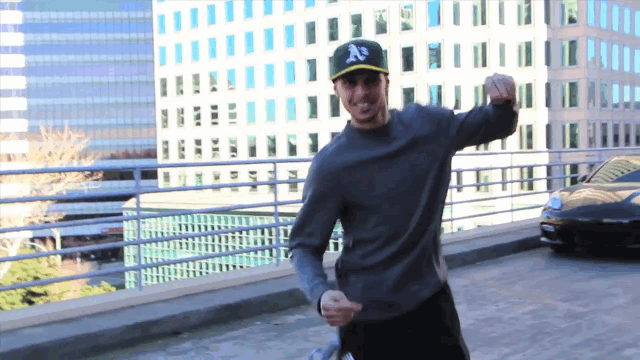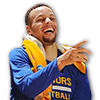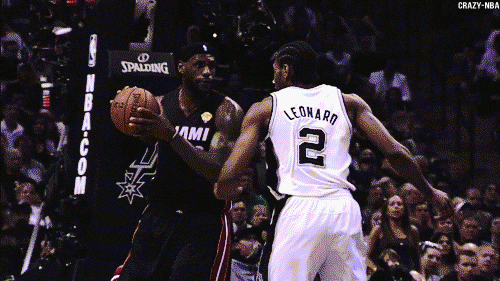Battles between LeBron James and Kevin Durant just aren't the same.
When the Cleveland Cavaliers play host to the Oklahoma City Thunder on Thursday night, it will mark the 20th time, through both the playoffs and regular season, these two NBA superstars have squared off against one another—a milestone befitting of what should be an iconic rivalry.
If only that rivalry existed.
Unique Dynamics

Ronald Martinez/Getty Images
Durant and James' rivalry reached its peak during the 2012 NBA Finals.
These matchups used to mean something special and spectacular. Durant and James were natural rivals, unendingly looped together not out of manufactured spite but by default, as a direct result of colliding clout and similar skill.
Every meeting was important, every outcome a measuring stick—a foreground for fights of fortune that pit the best player in the world, James, opposite his closest competitor, Durant.
This (friendly) conflict reached critical mass during, and immediately after, the 2012 NBA Finals. The Miami Heat, then James' team, emerged from the Eastern Conference to face a Durant-led Thunder squad that thoroughly steamrolled the rest of the Western Conference, dropping only three games through its first three rounds.
James had just earned his third MVP award, and the Heat—still kind of, sort of the new superteam on the block—were looking to avenge the 2011 Finals letdown dealt to them by the eventual champion Dallas Mavericks.
For James specifically, stark legacy implications were at stake. His teams were 0-2 in title rounds to that point, an unsavory record used to disparage his otherwise pristine individual standing. Now it was Durant, James' lone peer, blocking his path to a first championship.
It took James and the Heat five games to bust through that barrier. And at the time, it seemed as if this was the first of many more Finals showdowns.

DON EMMERT/Getty Images
Soon after this rivalry's peak, the 2012 NBA Finals, came its falling action.
Miami was now an established juggernaut in firm control of the easy East. Oklahoma City was young and overwhelmingly talented and, by all appearances, poised to supplant the San Antonio Spurs as the West's foremost contender.
Durant and James' being portrayed as frenemies only added to the intrigue, even if their relationship deviated from classic head-to-head protocols that stipulated player rivalries be constructed around a nucleus of intense dislike.
The two worked out together over the offseason. They were on the court as teammates, representing Team USA at the 2012 Olympics in London, just weeks after waging championship warfare. They were constantly linked to one another in a vast array of capacities. And that link would, for a short while, grow stronger despite their friendship—or perhaps because of it.
"They want the conflict. They want the hate," Durant told Sports Illustrated's Lee Jenkins in 2013 about the perception of his ties to James, alluding to the legendary rivalry between Larry Bird and Magic Johnson. "They forget Bird cried for Magic. A friend was getting on me about this recently, and I said, 'Calm down. I'm not taking it easy on him. Don't you know I'm trying to destroy the guy every time I go on the court?'"
Indeed, it was Durant who ended James' second streak of consecutive MVP campaigns in 2014, when he received the honor.
Little did we know that's where this affable, yet at the same time hyper-competitive, clash between two superstars would end.
Thunder(ous) Fall

Richard Rowe/Getty Images
Oklahoma City never turned into the recurring Finals participant it was supposed to.
That 2012 Finals encounter is thus far Durant and James' lone championship meetup—an unforeseen turn originally presumed impossible.
Even now, with the benefit of hindsight, it remains an unfathomable anticlimax. The Thunder have the NBA's second-highest regular-season winning percentage since that lockout-truncated 2011-12 crusade, while James is working on five straight Finals appearances, three of which have come after his first and only date with Durant.
It would seem, then, that Durant and James have had every opportunity—or at least enough chances—to rekindle their Finals fling.
But opportunity doesn't exist in a vacuum, as Oklahoma City knows only too well.
The Thunder's regular-season success has not been parlayed into postseason perpetuity. Though the cast of Durant, Serge Ibaka andRussell Westbrook remains, they have lost James Harden and, more importantly, fallen victim to a freak series of injuries.

Andrew D. Bernstein/Getty Images
Losing Harden to the Rockets is but a small part of Oklahoma City's inability to reach the Finals once again.
Two games into their 2013 playoff run, Oklahoma City, owner of the West's top seed, lost Westbrook to a torn meniscus in his right knee. Up 2-0 on the Houston Rockets at the time, the Thunder had enough juice to claw their way into the second round, where they met their maker in the form of the Memphis Grizzlies.
In 2014, during a second-round-clinching victory over the Los Angeles Clippers, Ibaka suffered a left calf injury. The Thunder began their Western Conference Finals dance against the Spurs without him, and by the time he returned, they were down 2-0 and could only muster a semi-convincing 2-2 series tie before bowing out.
Last season, the Thunder just didn't stand a chance.
Durant underwent three surgeries on his right foot over a span of six months and was limited to 18 appearances; Ibaka was lost for the season in March with a right knee injury; and Westbrook, though an MVP candidate, incurred his own setbacks, missing 15 games due to fractures in his right hand and right cheekbone. Oklahoma City missed the playoffs for the first time since 2009, further contributing to the demise of Durant and James' rivalry.
Infrequency doesn't breed competition, and the two MVPs have met just five times following their sole championship racket. Durant has been consumed with surviving the absences of irreplaceable running mates and rehabilitating his own injury windfall.
Worrying about where he stands relative to James these days isn't even a distant second on Durant's list of priorities.
A Rivalry Run Astray

Mark Duncan/Associated Press
The James-Durant rivalry, if it even exists, is different.
Part of what made the Durant-James rivalry so thoroughly, albeit briefly, exhilarating was the lingering need for each to prove what could only be proved at the expense of the other.
For Durant, it was usurping James as the NBA's best player before another candidate came along. For James, Durant was an obstacle he could clear that often had nothing to do with rings—those pieces of hardware that will always play a pivotal role in defining his legacy.
Both have since moved on. James is a two-time champion with no scores to settle and more entrenched in bringing Cleveland its first NBA title. Having already outperformed James in 2013-14, Durant is at that point of his career where titles trounce everything.
His most pressing concerns, aside from remaining healthy? The Golden State Warriors, the Spurs and an impending trip into free agency.
Those interests more accurately align with the rest of the league, which is low on team beefs and almost completely barren of any player-to-player rivalries. As CBS Sports' Zach Harper previously wrote:
In today's NBA, individual rivalry has given way to players trying to take down a team system that stands in their way. We've seen it with LeBron and the Celtics, Pistons, and Spurs in his career. We've seen it with Durant and the Spurs, Grizzlies, and now the Clippers. And maybe we'll just never get these two man-to-man with the game on the line and the will of one superstar upstaging the desire of the other.
Another Finals matchup would breathe some life into this decaying contest, and it's at least possible the future holds one. The Spurs and Warriors are mighty, but the Thunder are right behind them, posting the league's third-best net rating. The Cavaliers, meanwhile, are untouchable in the middle-class-mobbed East.
And it's not like the allure of James' and Durant's games is completely gone. They are still in their prime and always get up to face one another.
Durant vs. James (Playoffs and Regular Season)
W-L PTS/G FG% 3P% REB/G AST/G STL/G
Kevin Durant 4-15 29.7 50.3 40.8 6.5 3.2 1.4
LeBron James 15-4 29.1 51.3 33.3 7.4 6.7 2.1
Source: Basketball-Reference.
Still, for the time being, and perhaps for good, this rivalry has served its purpose.
When Durant and James meet Thursday, and however they meet in the future, they will do so as just another two friendly foes chasing victory and nothing more.
Stats courtesy of Basketball-Reference.com and are accurate leading into games on Dec. 16.
Dan Favale covers the NBA for Bleacher Report. Follow him on Twitter:@danfavale.
Kevin Durant and LeBron James: A Rivalry No More
When the Cleveland Cavaliers play host to the Oklahoma City Thunder on Thursday night, it will mark the 20th time, through both the playoffs and regular season, these two NBA superstars have squared off against one another—a milestone befitting of what should be an iconic rivalry.
If only that rivalry existed.
Unique Dynamics

Ronald Martinez/Getty Images
Durant and James' rivalry reached its peak during the 2012 NBA Finals.
These matchups used to mean something special and spectacular. Durant and James were natural rivals, unendingly looped together not out of manufactured spite but by default, as a direct result of colliding clout and similar skill.
Every meeting was important, every outcome a measuring stick—a foreground for fights of fortune that pit the best player in the world, James, opposite his closest competitor, Durant.
This (friendly) conflict reached critical mass during, and immediately after, the 2012 NBA Finals. The Miami Heat, then James' team, emerged from the Eastern Conference to face a Durant-led Thunder squad that thoroughly steamrolled the rest of the Western Conference, dropping only three games through its first three rounds.
James had just earned his third MVP award, and the Heat—still kind of, sort of the new superteam on the block—were looking to avenge the 2011 Finals letdown dealt to them by the eventual champion Dallas Mavericks.
For James specifically, stark legacy implications were at stake. His teams were 0-2 in title rounds to that point, an unsavory record used to disparage his otherwise pristine individual standing. Now it was Durant, James' lone peer, blocking his path to a first championship.
It took James and the Heat five games to bust through that barrier. And at the time, it seemed as if this was the first of many more Finals showdowns.

DON EMMERT/Getty Images
Soon after this rivalry's peak, the 2012 NBA Finals, came its falling action.
Miami was now an established juggernaut in firm control of the easy East. Oklahoma City was young and overwhelmingly talented and, by all appearances, poised to supplant the San Antonio Spurs as the West's foremost contender.
Durant and James' being portrayed as frenemies only added to the intrigue, even if their relationship deviated from classic head-to-head protocols that stipulated player rivalries be constructed around a nucleus of intense dislike.
The two worked out together over the offseason. They were on the court as teammates, representing Team USA at the 2012 Olympics in London, just weeks after waging championship warfare. They were constantly linked to one another in a vast array of capacities. And that link would, for a short while, grow stronger despite their friendship—or perhaps because of it.
"They want the conflict. They want the hate," Durant told Sports Illustrated's Lee Jenkins in 2013 about the perception of his ties to James, alluding to the legendary rivalry between Larry Bird and Magic Johnson. "They forget Bird cried for Magic. A friend was getting on me about this recently, and I said, 'Calm down. I'm not taking it easy on him. Don't you know I'm trying to destroy the guy every time I go on the court?'"
Indeed, it was Durant who ended James' second streak of consecutive MVP campaigns in 2014, when he received the honor.
Little did we know that's where this affable, yet at the same time hyper-competitive, clash between two superstars would end.
Thunder(ous) Fall

Richard Rowe/Getty Images
Oklahoma City never turned into the recurring Finals participant it was supposed to.
That 2012 Finals encounter is thus far Durant and James' lone championship meetup—an unforeseen turn originally presumed impossible.
Even now, with the benefit of hindsight, it remains an unfathomable anticlimax. The Thunder have the NBA's second-highest regular-season winning percentage since that lockout-truncated 2011-12 crusade, while James is working on five straight Finals appearances, three of which have come after his first and only date with Durant.
It would seem, then, that Durant and James have had every opportunity—or at least enough chances—to rekindle their Finals fling.
But opportunity doesn't exist in a vacuum, as Oklahoma City knows only too well.
The Thunder's regular-season success has not been parlayed into postseason perpetuity. Though the cast of Durant, Serge Ibaka andRussell Westbrook remains, they have lost James Harden and, more importantly, fallen victim to a freak series of injuries.

Andrew D. Bernstein/Getty Images
Losing Harden to the Rockets is but a small part of Oklahoma City's inability to reach the Finals once again.
Two games into their 2013 playoff run, Oklahoma City, owner of the West's top seed, lost Westbrook to a torn meniscus in his right knee. Up 2-0 on the Houston Rockets at the time, the Thunder had enough juice to claw their way into the second round, where they met their maker in the form of the Memphis Grizzlies.
In 2014, during a second-round-clinching victory over the Los Angeles Clippers, Ibaka suffered a left calf injury. The Thunder began their Western Conference Finals dance against the Spurs without him, and by the time he returned, they were down 2-0 and could only muster a semi-convincing 2-2 series tie before bowing out.
Last season, the Thunder just didn't stand a chance.
Durant underwent three surgeries on his right foot over a span of six months and was limited to 18 appearances; Ibaka was lost for the season in March with a right knee injury; and Westbrook, though an MVP candidate, incurred his own setbacks, missing 15 games due to fractures in his right hand and right cheekbone. Oklahoma City missed the playoffs for the first time since 2009, further contributing to the demise of Durant and James' rivalry.
Infrequency doesn't breed competition, and the two MVPs have met just five times following their sole championship racket. Durant has been consumed with surviving the absences of irreplaceable running mates and rehabilitating his own injury windfall.
Worrying about where he stands relative to James these days isn't even a distant second on Durant's list of priorities.
A Rivalry Run Astray

Mark Duncan/Associated Press
The James-Durant rivalry, if it even exists, is different.
Part of what made the Durant-James rivalry so thoroughly, albeit briefly, exhilarating was the lingering need for each to prove what could only be proved at the expense of the other.
For Durant, it was usurping James as the NBA's best player before another candidate came along. For James, Durant was an obstacle he could clear that often had nothing to do with rings—those pieces of hardware that will always play a pivotal role in defining his legacy.
Both have since moved on. James is a two-time champion with no scores to settle and more entrenched in bringing Cleveland its first NBA title. Having already outperformed James in 2013-14, Durant is at that point of his career where titles trounce everything.
His most pressing concerns, aside from remaining healthy? The Golden State Warriors, the Spurs and an impending trip into free agency.
Those interests more accurately align with the rest of the league, which is low on team beefs and almost completely barren of any player-to-player rivalries. As CBS Sports' Zach Harper previously wrote:
In today's NBA, individual rivalry has given way to players trying to take down a team system that stands in their way. We've seen it with LeBron and the Celtics, Pistons, and Spurs in his career. We've seen it with Durant and the Spurs, Grizzlies, and now the Clippers. And maybe we'll just never get these two man-to-man with the game on the line and the will of one superstar upstaging the desire of the other.
Another Finals matchup would breathe some life into this decaying contest, and it's at least possible the future holds one. The Spurs and Warriors are mighty, but the Thunder are right behind them, posting the league's third-best net rating. The Cavaliers, meanwhile, are untouchable in the middle-class-mobbed East.
And it's not like the allure of James' and Durant's games is completely gone. They are still in their prime and always get up to face one another.
Durant vs. James (Playoffs and Regular Season)
W-L PTS/G FG% 3P% REB/G AST/G STL/G
Kevin Durant 4-15 29.7 50.3 40.8 6.5 3.2 1.4
LeBron James 15-4 29.1 51.3 33.3 7.4 6.7 2.1
Source: Basketball-Reference.
Still, for the time being, and perhaps for good, this rivalry has served its purpose.
When Durant and James meet Thursday, and however they meet in the future, they will do so as just another two friendly foes chasing victory and nothing more.
Stats courtesy of Basketball-Reference.com and are accurate leading into games on Dec. 16.
Dan Favale covers the NBA for Bleacher Report. Follow him on Twitter:@danfavale.
Kevin Durant and LeBron James: A Rivalry No More
Last edited:










